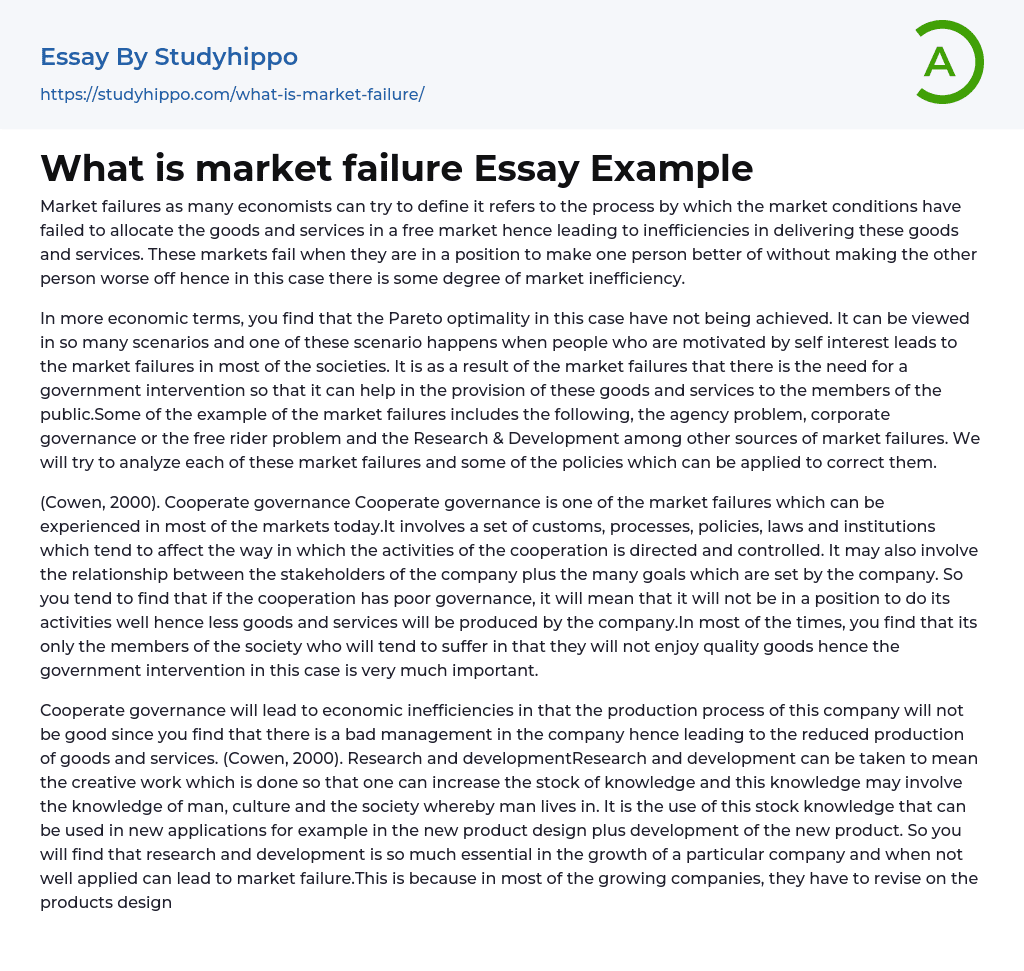The inefficiencies of the free market in distributing goods and services are referred to as market failures by economists. These occur when an action benefits one person while negatively affecting others, leading to inefficient markets.
The Pareto optimality has not been achieved in this case, from an economic perspective. This situation can be observed in numerous scenarios, one of which occurs when individuals who are motivated by self-interest create market failures in most societies. These market failures require government intervention to provide goods and services to the public. Examples of market failures include the agency problem, corporate governance, the free rider problem, and Research & Development, among other sources. We will analyze each of these market failures and suggest policies to correct them.
(Cowen, 2000). Corporate governance can be a market failure present in many markets today. It includes customs, processes, policies,
...laws, and institutions that influence the direction and control of company activities. It also involves the relationship between company stakeholders and the goals set by the company. Poor governance leads to less productive company activities and reduced goods and services. Ultimately, society members suffer due to poor quality goods unless the government intervenes.
Cowen (2000) states that inadequate management in a company can cause economic inefficiencies, which affect production and decrease the output of goods and services. Thus, effective corporate governance is crucial for ensuring efficient production processes.
Research and development involves innovative work that enhances knowledge related to humanity, culture, and society. This knowledge can be utilized in creating new products, making it essential for a company's progress. Neglecting research and development may result in market failure as technology continues to evolve and companies must updat
their product designs and range.
To remain competitive, companies must adapt to changing customer preferences and new competition by prioritizing cooperation with other competitors. Market research is crucial in this process as it involves gathering and interpreting business information related to newly introduced products. This helps producers understand the market, potential opportunities, and product viability. Market research answers questions such as identifying the target audience, determining optimal launch timing, and evaluating sales potential. Organizations that employ market research in their development process are more likely to succeed while those that don't face market failures (Cowen, 2000).
One of the main reasons for market failures is the problem of agency within cooperations. It is common to find that managers in such establishments prioritize their own interests over those of their shareholders, resulting in disloyalty. Such behavior can discourage shareholders, potentially leading to the closure of the business. This recurrent issue is linked to the way organizations structure their incentives and is a challenge that must be addressed.
Cowen (2000) states that if the directors, managers, and employees of a company misuse its resources, it can cause the business to close. To prevent this from happening, these individuals can be encouraged through different incentives - including moral, material, and coercive ones - to ensure their actions are in line with the organization's goals.
To mitigate the adverse effects of market failures on societal access to goods and services resulting from inefficiencies, public policies can be implemented. The government has an obligation to intervene and rectify such markets. One policy that may aid small businesses in competing with larger corporations is by offering incentives.
The high cost of
market research may prevent infant companies from conducting it. The government can address this issue by providing incentives to support research and development, such as product life cycle analysis, expansion into new markets, and related research that aids growth. Cowen (2000) recommends subsidies as a viable policy option for the government to provide financial assistance to producers and encourage more production and competitiveness in the market by allowing them to lower their prices.
Cowen (2000) suggests that offering subsidies to companies can motivate them to increase production and act as a form of protectionism, ultimately reducing agency problems and market failures caused by insufficient funding. Inefficient economies often experience market failures due to ineffective management strategies implemented by companies. To address these issues, it is necessary for the government to intervene and establish policies that assist companies in improving their performance.
- Accident essays
- Awareness essays
- Benefits of Volunteering essays
- Challenges essays
- Childhood Memories essays
- Decision essays
- Driving essays
- Event essays
- Excellence essays
- Expectations essays
- Failure essays
- Farewell essays
- Flight essays
- Gift essays
- Growing Up essays
- Ignorance essays
- Improve essays
- Incident essays
- Knowledge essays
- Luck essays
- Memories essays
- Mistake essays
- Obstacles essays
- Overcoming Challenges essays
- Party essays
- Peace Corps essays
- Personal Experience essays
- Problems essays
- Sacrifices essays
- Struggle essays
- Success essays
- Trust essays
- Vacation essays
- Visit essays
- Volunteering essays
- Incentive essays
- American Dream essays
- Barriers To Entry essays
- Capitalism essays
- Central Bank essays
- Compensation essays
- Consumerism essays
- Economic Development essays
- Economic Growth essays
- Economic Inequality essays
- Economic System essays
- Economy essays
- Employment essays
- Export essays
- Finance essays




